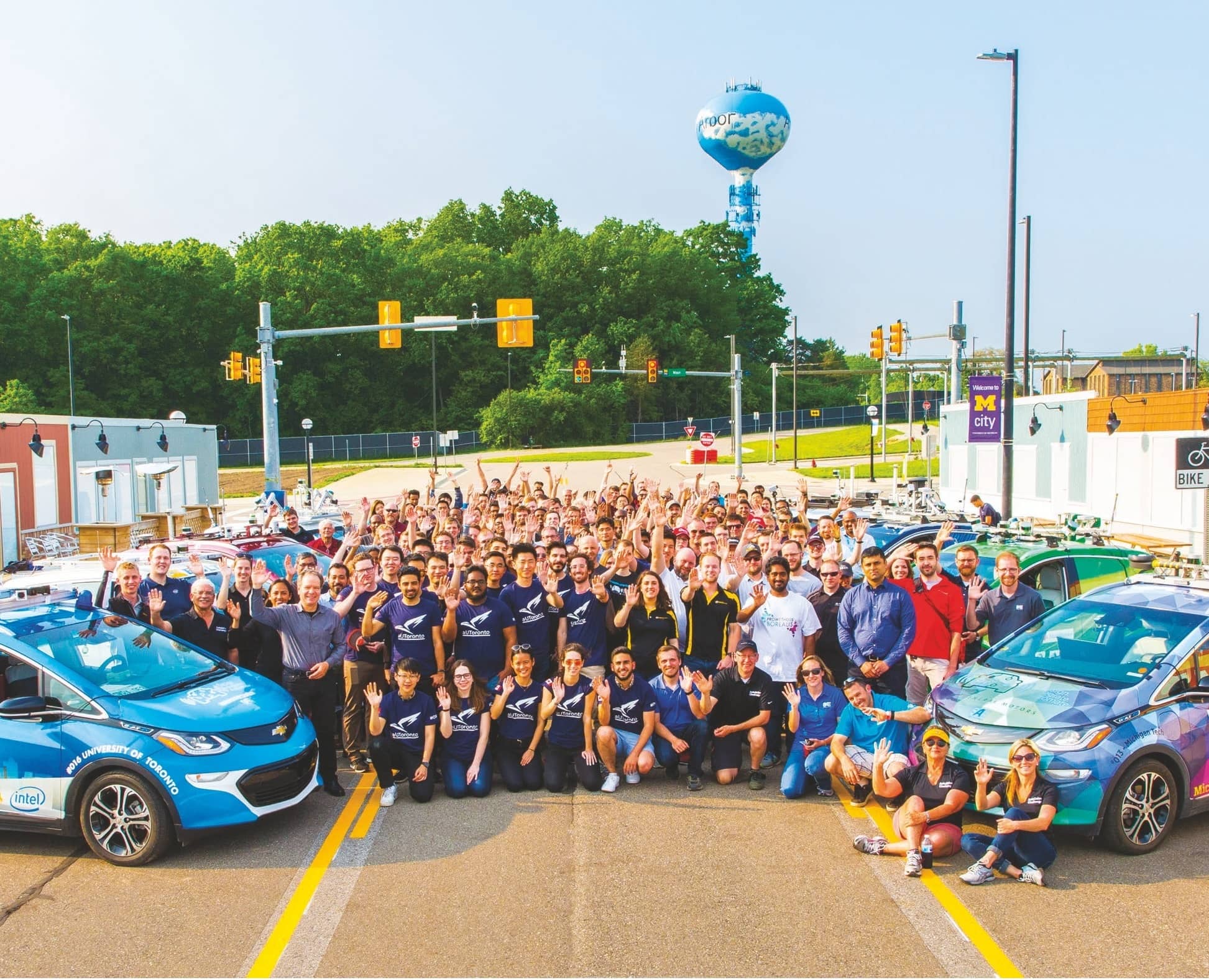Intentar ORO - Gratis
Up For a Challenge
Muse Science Magazine for Kids
|May/June 2020
University students compete with cutting-edge cars in the AutoDrive Challenge.

It was Memorial Day 2019, just days before the big AutoDrive Challenge. Kettering University’s team was testing its car before shipping it to the competition. Suddenly the smell of smoke filled the air. The tester slammed the emergency stop button. That button shut everything off, ensuring everyone’s safety. But their computer, the heart and soul of their project car, was done for.
The team didn’t panic. More teammates came in on the holiday. They stayed till 4:00 a.m. to fix what they could. They left for the competition with their Chevy Bolt, a compact electric car, and a fried computer. A sponsor sent a computer to them, but the team would have to put it together when they got there.

What the Challenge Is All About
In the AutoDrive Challenge, college students from across North America are working to turn full-size electric cars into self-driving cars. It is a three-year process where teams take on progressively harder challenges. This new competition is sponsored by the Society of Automotive Engineers (SAE) and carmaker General Motors. In 2018, eight colleges and universities were invited to participate. Kettering University in Flint, Michigan, was one of them.
Kathryn Cesiel, 22, is a mechanical and electrical engineering student and a member of Kettering’s AutoDrive team. She works as a safety team leader.
Esta historia es de la edición May/June 2020 de Muse Science Magazine for Kids.
Suscríbete a Magzter GOLD para acceder a miles de historias premium seleccionadas y a más de 9000 revistas y periódicos.
¿Ya eres suscriptor? Iniciar sesión
MÁS HISTORIAS DE Muse Science Magazine for Kids

Muse Science Magazine for Kids
ANIMAL FIREFIGHTER TO THE RESCUE
Can animals help manage the risks of deadly wildfires?
3 mins
Muse July 2025: The Story Behind Wildfires

Muse Science Magazine for Kids
FIRE DANGER
WHY THE RISK OF WILDFIRES KEEPS GROWING
4 mins
Muse July 2025: The Story Behind Wildfires

Muse Science Magazine for Kids
The Miller NEW Normal
WHAT TODAY’S WILDFIRES TELL US ABOUT OUR FUTURE
8 mins
Muse July 2025: The Story Behind Wildfires

Muse Science Magazine for Kids
WOMEN AND FIREFIGHTING: A GOOD FIT
Jessica Gardetto is a firefighter. Her father was, too. “I grew up with my dad coming home smelling like wildfire and covered in soot,” she says.
1 min
Muse July 2025: The Story Behind Wildfires

Muse Science Magazine for Kids
What is happening on your fingertips when they get all wrinkly in a hot tub?
—Felix G., age 10, Montana
1 mins
Muse July 2025: The Story Behind Wildfires

Muse Science Magazine for Kids
WHEN the SMOKE CLEARS
THE LINGERING EFFECTS OF THE RECENT PACIFIC PALISADES AND ALTADENA EATON FIRES
6 mins
Muse July 2025: The Story Behind Wildfires

Muse Science Magazine for Kids
PICKING TEAMS
Keep it fair with a strategy that relies on geometry.
2 mins
Muse July 2025: The Story Behind Wildfires

Muse Science Magazine for Kids
SHAN CAMMACK
WILDLIFE BIOLOGIST AND FIRE SAFETY OFFICER
3 mins
Muse July 2025: The Story Behind Wildfires

Muse Science Magazine for Kids
Scientists Create Mice With Woolly Mammoth-Like Fur
RESEARCHERS AT A COMPANY IN TEXAS ARE WORKING TO CREATE A LIVING ANIMAL THAT RESEMBLES THE EXTINCT WOOLLY MAMMOTH. Recently, they produced mice with traits of the large mammal. The mice all have coats with mammoth-like fur, and some of the small mammals also have genes that help them store fat. Both features would help the animals survive in the cold Arctic, where the woolly mammoth once lived.
1 min
Muse July 2025: The Story Behind Wildfires

Muse Science Magazine for Kids
Cool Sunshade Added to the Nancy Roman Space Telescope
THE NANCY ROMAN SPACE TELESCOPE IS A NEW TELESCOPE THAT NASA IS BUILDING AND WILL LAUNCH INTO SPACE, LIKELY IN EARLY 2027.
1 min
Muse July 2025: The Story Behind Wildfires
Translate
Change font size
